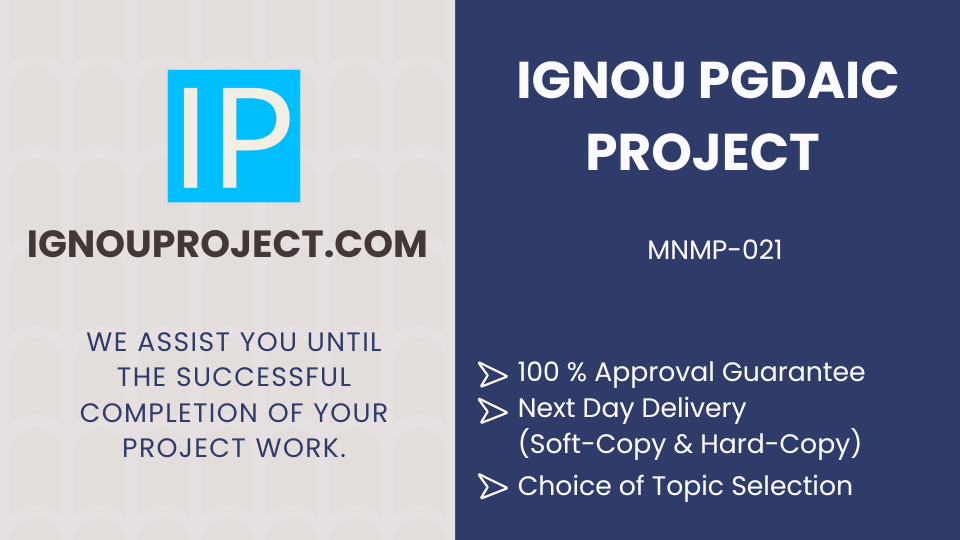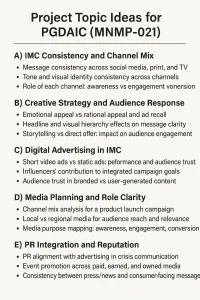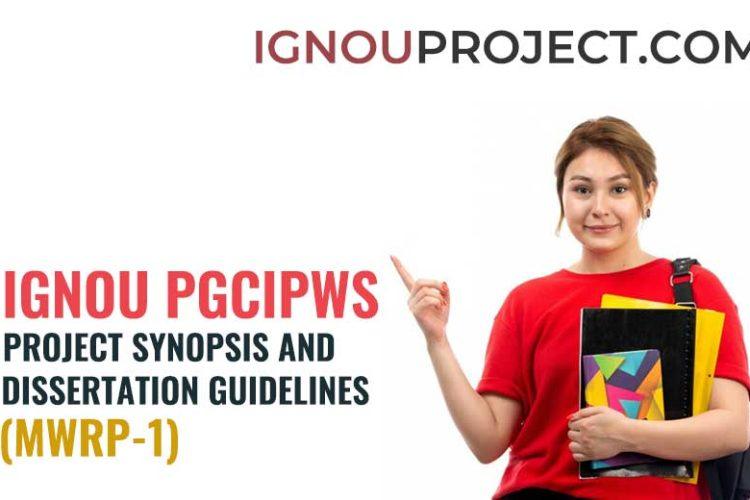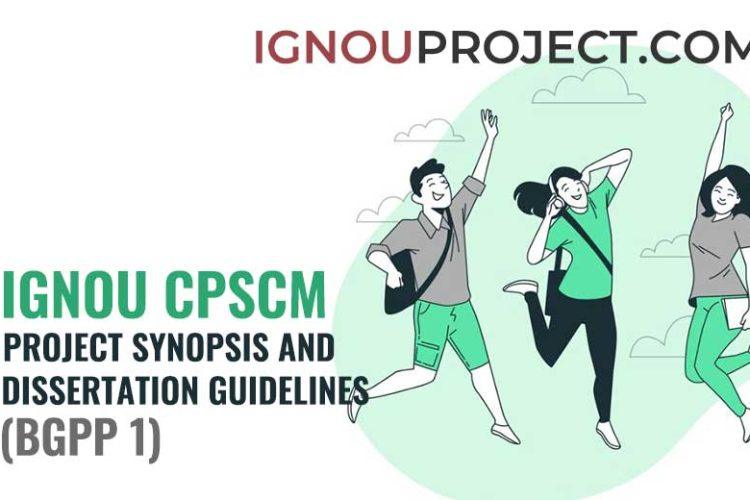
The IGNOU PGDAIC Project for MNMP-021 is the practical part of the Advertising and Integrated Communication programme. It assesses how well concepts like campaign planning, audience insight, media strategy, creative execution, and integrated messaging can be applied to a real communication problem.
An Overview of IGNOU PGDAIC Project (MNMP-021)
Branding and marketing are very important right now, as seen in the IGNOU PGDAIC Project (MNMP-021). People think that persuasion strategies like PR and advertising are the way of the future in their fields. There are lots of jobs in these areas that need trained people to fill them.
When you finish the IGNOU PGDAIC Project, you will know how to use different types of media to create persuasive campaigns for a business, organization, or service. You will also have gained skills and information that will make you valuable in the persuasive media field. Plan and run events for your brands, know how to strategically handle your customers’ online media, be able to plan and run media campaigns, and be familiar with how to advocate for causes in the social sector.
What is the IGNOU PGDAIC project?
The Indira Gandhi National Open University (IGNOU) offers a Post Graduate Diploma in Artificial Intelligence and Computing (PGDAIC) program, which includes a final project component. This project is an essential part of the curriculum and is designed to provide students with practical experience in applying the concepts, theories, and methodologies they have learned throughout the course to real-world scenarios or research in the field of artificial intelligence and computing.
MNMP-021 Code Clarification (What the PGDAIC Course Requires)
MNMP-021 is the project component within the PGDAIC structure. It usually expects a learner to:
- Select an advertising or integrated communication problem
- Prepare a synopsis (proposal) before starting full work
- Conduct a small research-based study or campaign-based analysis
- Present findings using a proper report format
- Submit the final project with required documents and guide certification (where applicable)
The PGDAIC project should stay aligned with Advertising and Integrated Communication, such as brand communication, media planning, creative strategy, digital campaigns, PR integration, audience analysis, and campaign effectiveness.
Key Guidelines for the IGNOU PGDAIC Project for MNMP-021
1) Keep the scope realistic
A strong MNMP-021 project uses a clear problem and a limited scope. A focused project is easier to complete and easier to evaluate.
2) Choose one clear research approach
Most projects follow one of these approaches:
- Primary research: surveys, interviews, focus discussions (small-scale), observation
- Secondary analysis: content analysis of ads, campaign comparison, media audits, brand communication review
- Mixed approach: limited primary data + structured secondary analysis
3) Maintain academic discipline
The report should show:
- Clear objectives
- Logical chapter flow
- Correct use of simple tools (tables, charts, thematic analysis)
- Evidence-based conclusions linked to findings
4) Avoid common rule breaks
- Do not copy content from the internet, past projects, or templates
- Do not change the approved topic after synopsis acceptance (unless the process allows formal change)
- Do not submit without required certificates and signed pages
Must Read: IGNOU Project Guidelines
PGDAIC Project Topic Selection for MNMP-021
A good topic for Advertising and Integrated Communication should meet these conditions:
- Fits PGDAIC learning areas (advertising + integrated communication)
- Allows data collection or structured analysis
- Has clear stakeholders (brand, audience, channel)
- Produces measurable output (insights, recommendations, message plan, media mix, campaign review)
Topic selection checklist
- Is the topic specific (brand/category/region/channel)?
- Can data be collected within available time?
- Are objectives measurable?
- Does it support IMC (not only one isolated activity)?
MNMP-021 Project Topic Ideas (Advertising and Integrated Communication)
These ideas can be adapted to a product category, service sector, region, or audience group:
A) Integrated Campaign Planning and Review
- Integrated campaign evaluation for a brand across TV, print, digital, and outdoor
- Consistency of brand message across multiple channels
- Role of influencer content within an integrated campaign
B) Digital Advertising and Performance Communication
- Audience response to short video ads on social platforms
- Creative elements that improve ad recall in mobile-first campaigns
- Comparison of engagement patterns across social ad formats
C) Consumer Insight and Brand Communication
- Factors affecting purchase intent after exposure to integrated messaging
- Consumer trust in brand claims: ad message vs user reviews
- Perception study of brand identity and positioning
D) Media Planning and Media Mix
- Media mix effectiveness for a product launch campaign
- Comparative study of local vs national media for a target segment
- Media planning approach for reaching youth audiences
E) Content, Creativity, and Message Strategy
- Content analysis of ad storytelling styles in a category
- Study of humour vs emotional appeal in advertising outcomes
- Visual design elements linked to brand recall
F) Public Relations Integration
- Role of PR in crisis communication and brand recovery
- Integration of PR and digital media in event promotions
- Media coverage analysis and message alignment
Tip: Keep the title narrow. For example, replace “digital ads” with “short video ads on social platforms for a youth audience in one city.”
Trending Project Topics for IGNOU PGDAIC Project (MNMP-021)
- Developing an AI-based Diagnostic Tool for Early Detection of Diseases
Use machine learning algorithms to analyze medical images or patient data for early disease detection, such as cancer or neurodegenerative diseases.
- AI for Predictive Maintenance in Manufacturing
Create a system that uses AI to predict when industrial equipment will require maintenance, thereby reducing downtime and increasing efficiency.
- Natural Language Processing for Real-Time Voice Translation
Develop a real-time voice translation system using advanced NLP techniques, focusing on minimizing translation errors and latency.
- AI-Driven Cyber security Threat Detection
Implement a system that uses AI to identify and respond to cyber security threats in real-time, improving the security of digital assets.
- Machine Learning for Personalized Education
Develop an AI system that adapts learning material and assessments based on individual student performance and learning styles.
- AI in Climate Change Prediction and Analysis
Utilize AI and big data analytics to model and predict climate change impacts, aiding in more informed environmental policy-making.
- Autonomous Vehicle Navigation in Urban Environments
Create an AI system that helps autonomous vehicles navigate complex urban environments safely and efficiently.
- AI for Enhancing Agricultural Yield and Sustainability
Develop AI models to optimize farming practices, predict crop yields, and monitor soil and plant health.
- Deep Learning for Facial Recognition in Varied Conditions
Improve facial recognition technology using deep learning to accurately identify individuals in different lighting, angles, and environmental conditions.
- AI-Assisted Drug Discovery and Development
Use AI algorithms to accelerate the drug discovery process, predicting potential drug candidates and their effectiveness.
- Block chain and AI Integration for Secure Transactions
Explore the integration of blockchain with AI to enhance the security and efficiency of digital transactions.
- AI for Waste Management and Recycling
Develop an AI system to automate and optimize waste sorting and recycling processes.

Image: Project Topics Ideas for PGDAIC (MNMP-021)
PGDAIC Synopsis Writing for MNMP-021 (Advertising & Integrated Communication)
A synopsis is the project plan. It must clearly show IMC focus: audience, message, channels, and measurable outcomes.
Short synopsis structure
- Title: specific, IMC-focused (brand + audience + channels).
- Background: brief context of the communication problem.
- Problem Statement: one clear issue to solve or assess.
- Objectives (3–6): measurable (awareness, recall, perception, engagement, intent).
- Research Questions: directly linked to objectives.
- Scope & Limitations: what is included/excluded (time, geography, sample).
- Methodology: design + sample + tools + collection + analysis plan.
- Chapter Plan: tentative index.
- Timeline: simple week plan.
- Ethics Note: consent, privacy, accurate reporting.
Avoid
- Broad objectives like “study advertising”
- Method without tools (no questionnaire/coding sheet)
- Opinion-only topics without data
- Non-IMC projects (pure sales/finance focus)
MNMP-021 Project Report Format (PGDAIC – Advertising & Integrated Communication)
Front pages
- Title page
- Student declaration (signed)
- Guide certificate (signed, if required)
- Abstract (150–250 words)
- Contents + list of tables/figures (if used)
Main chapters
- Introduction: background, problem, objectives, scope, limits
- IMC Concepts & Framework: audience insight, positioning, message strategy, creative appeals, channel roles
- Methodology: design, sample, tools, procedure, analysis plan
- Analysis & Results: tables/themes; focus on outcomes (clarity, recall, trust, engagement, intent)
- Findings, Conclusion & Recommendations: objective-wise findings + practical IMC improvements
Annexures
- Questionnaire/interview guide
- Coding sheet (for content analysis)
- Extra tables/creative samples (only if needed)
Guide/Supervisor Selection & Eligibility (PGDAIC – Advertising & Integrated Communication)
What to look for
- Expertise in advertising, media, communication, marketing communication, or digital communication
- Comfortable with basic research and report review
- Available for synopsis + drafts
- Willing to certify as required
Why it matters
- Keeps objectives measurable and IMC-aligned
- Ensures tools capture communication outcomes
- Helps deliver integrated recommendations (not single-channel fixes)
Key Aspects of the IGNOU PGDAIC Project
- Application of Knowledge: The project allows students to apply theoretical knowledge to practical problems or research questions in artificial intelligence, machine learning, data science, or related areas.
- Research and Development: Students are typically required to undertake a research-based project where they may develop a new application, algorithm, or conduct an in-depth study on a specific topic within the domain of AI and computing.
- Project Proposal/Synopsis: Students must initially submit a project proposal or synopsis, outlining the objectives, scope, methodology, and expected outcomes of their project. This proposal is subject to approval by the university.
- Supervision: The project is usually carried out under the guidance of a supervisor or mentor, who provides support and advice throughout the process.
- Project Report: Upon completion of the project, students must prepare a detailed project report. This report typically includes an introduction, literature review, methodology, results, discussion, and conclusions.
- Evaluation: The final project is evaluated based on the quality of research, analysis, innovation, and the report presented. In some cases, a viva-voce or presentation may also be part of the evaluation process.
- Learning Outcome: The IGNOU PGDAIC Project aims to develop critical thinking, problem-solving, research, and technical skills relevant to the field of AI and computing.
PGDAIC (MNMP-021) Submission Process (Step-by-Step)
The submission process usually works best when handled as a sequence.
- Understand project requirements for MNMP-021
Identify what must be submitted: synopsis, final report, certificates, and any forms. - Finalise a topic within Advertising and Integrated Communication
Keep the topic focused and workable. - Select a guide/supervisor
Confirm subject fit and availability. - Prepare and submit the synopsis (as required)
Wait for approval or acceptance before full execution if the process requires it. - Conduct research or structured campaign analysis
Use the planned tools and record data carefully. - Write the report in the recommended format
Ensure each objective has related analysis and findings. - Complete required signatures and attachments
Title page details, declaration, certificates, and annexures must be complete. - Submit through the correct channel
Submit at the designated centre/portal/process used for project submission. - Keep proof and copies
Keep a copy of the final report and acknowledgement/receipt details.
FAQs in IGNOU PGDAIC Project for MNMP-021
What is the IGNOU PGDAIC Project for MNMP-021?
It is the project course in PGDAIC that evaluates applied skills in advertising and integrated communication through a research-based report or structured campaign analysis.
Which topics are safest for MNMP-021?
Campaign audits, content analysis of ads, audience perception studies, media mix reviews, and integration checks across channels are usually safe and programme-aligned.
Can the project be only digital advertising?
Yes, if it still shows integration logic, such as consistent messaging across digital formats or coordination between paid content and other communication channels.
What research methods work for MNMP-021?
Small surveys, interviews, content analysis of advertisements, campaign comparison, and mixed approaches work well if objectives remain measurable.
Is a synopsis required for MNMP-021?
A synopsis is commonly required to approve the topic and method before full work starts. It should include objectives, methodology, and a chapter plan.
Downloadable PDFs
Final Words
The IGNOU PGDAIC Project for MNMP-021 stays within Advertising and Integrated Communication, uses simple methods, and presents objective findings usually performs well. For structured support with MNMP-021 topic selection, synopsis preparation, and final report formatting aligned to PGDAIC Advertising and Integrated Communication, visit ignouproject.com or contact us.

